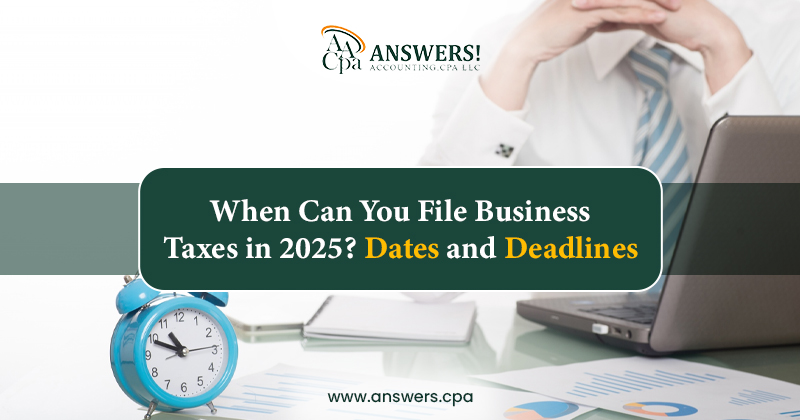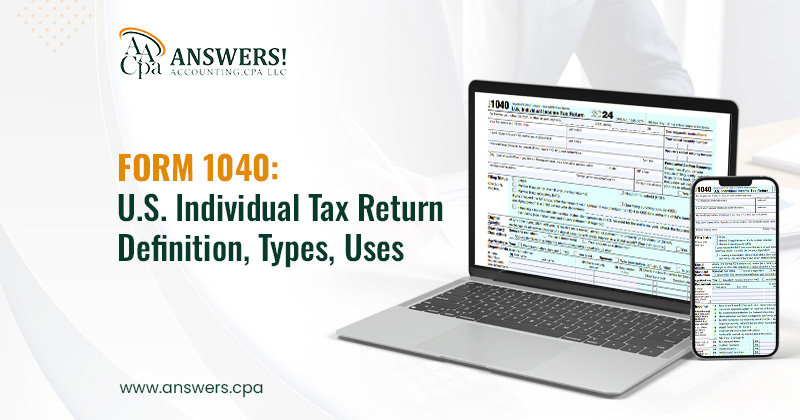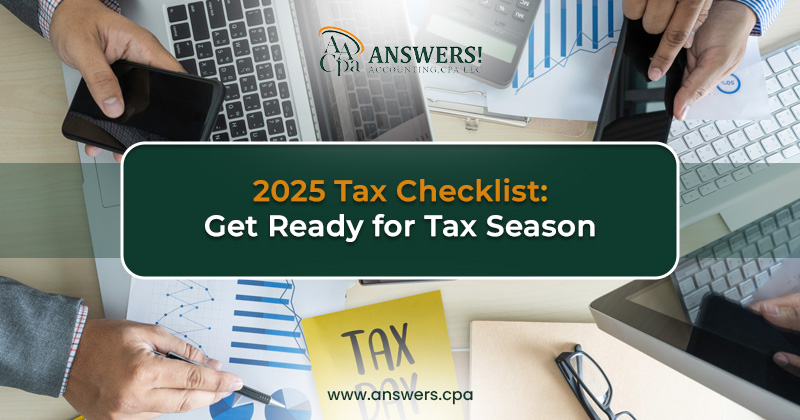2025 Business Tax Filing Deadlines | Your Complete Guide
Filing business taxes can feel overwhelming, but staying informed about key dates and deadlines is essential for every business owner. Missing deadlines can result in penalties, interest charges, or even legal complications. To avoid these issues, it’s important to understand when you can file your business taxes in 2025 and the critical dates you need to mark on your calendar. This guide will help you navigate the process with ease.
Why Filing Business Taxes on Time is Crucial
Filing your business taxes on time isn’t just a legal requirement—it’s a good business practice. Timely filing ensures you:
- Avoid Penalties: The IRS imposes penalties for late filing or payment. Even small delays can lead to significant fines.
- Maintain Business Reputation: Filing on time shows you’re responsible and organized, which is crucial for maintaining trust with clients and stakeholders.
- Plan Finances Better: Meeting tax deadlines helps you manage your cash flow effectively and avoid unexpected financial strain.
- Stay Compliant with the Law: Ignoring deadlines can lead to audits or legal issues, disrupting your business operations.
- Take Advantage of Tax Benefits: Timely filing allows you to claim deductions and credits without missing out due to rushed or incomplete submissions.
By understanding your tax responsibilities and planning ahead, you can minimize stress and keep your business running smoothly.
Key Deadlines for Filing Business Taxes in 2025
The deadlines for business taxes depend on your business structure. Below are the critical dates to keep in mind for 2025:
1. Sole Proprietors and Single-Member LLCs
If you operate as a sole proprietor or a single-member LLC, you’ll report your business income on your personal tax return (Form 1040) using Schedule C.
- Filing Deadline: Tuesday, April 15, 2025
- Extension Deadline: If you request an extension, you have until Wednesday, October 15, 2025, to file your return.
- Quarterly Estimated Taxes: If your business earns consistent income throughout the year, you may be required to pay quarterly estimated taxes. These deadlines are:
- April 15, 2025
- June 17, 2025
- September 16, 2025
- January 15, 2026
2. Partnerships and Multi-Member LLCs
Partnerships and multi-member LLCs must file an informational tax return (Form 1065). Each partner also receives a Schedule K-1, which reports their share of income, deductions, and credits.
- Filing Deadline: Monday, March 17, 2025 (since March 15 falls on a Saturday)
- Extension Deadline: You can file for an extension until Monday, September 15, 2025.
- State Requirements: Be sure to check state-specific deadlines for partnership taxes, as they may differ from federal requirements.
3. S Corporations
S corporations use Form 1120-S to report income, deductions, and credits. Shareholders also receive a Schedule K-1.
- Filing Deadline: Monday, March 17, 2025
- Extension Deadline: The extended deadline is Monday, September 15, 2025.
Quarterly Estimated Taxes: Shareholders of S corporations may need to pay estimated taxes on their share of income. Follow the same quarterly dates as sole proprietors.
4. C Corporations
C corporations file their taxes using Form 1120. The filing date depends on the fiscal year-end of the corporation.
1. Calendar Year-End Corporations:
- Filing Deadline: Tuesday, April 15, 2025
- Extension Deadline: Wednesday, October 15, 2025
2. Non-Calendar Year-End Corporations:
- The filing deadline is the 15th day of the fourth month after the end of the fiscal year.
3. Special Cases: Some C corporations with unique fiscal years or special situations may have different deadlines. Confirm with your tax professional.
5. Nonprofit Organizations
Nonprofits must file an annual information return (Form 990) to maintain their tax-exempt status.
- Filing Deadline: Thursday, May 15, 2025 (for calendar year filers)
- Extension Deadline: You can request a six-month extension, moving the deadline to Friday, November 14, 2025.
- State Requirements: Nonprofits should also review state-specific filing requirements for maintaining tax-exempt status.
What Happens if You Miss a Deadline?
Missing a tax deadline can have serious consequences. Here’s what you need to know:
1. Late Filing Penalties
The IRS charges a penalty of 5% of the unpaid taxes for each month (or part of a month) your return is late, up to a maximum of 25%.
2. Late Payment Penalties
If you don’t pay your taxes by the due date, the penalty is 0.5% of the unpaid taxes for each month, up to 25%. Both penalties can be applied simultaneously if you fail to file and pay on time.
3. Interest on Unpaid Taxes
The IRS also charges interest on any unpaid taxes, which accrues daily. The interest rate is determined quarterly and includes the federal short-term rate plus 3%.
4. Loss of Tax Benefits
Filing late can also result in the loss of certain deductions or credits, which could increase your overall tax liability.
To avoid these issues, it’s crucial to file on time or request an extension if necessary.
How to Request an Extension
If you need more time to file your business taxes, you can request an extension. Here’s how:
1. File Form 4868 (Individuals)
Sole proprietors and single-member LLCs can use Form 4868 to request an extension. This gives you until October 15, 2025, to file your return.
2. File Form 7004 (Businesses)
Partnerships, corporations, and other business entities should file Form 7004 for an extension.
- Deadline to Request: Submit the extension form by the original filing deadline (e.g., March 17 or April 15, 2025).
- Important Note: An extension to file is not an extension to pay. You must estimate and pay any taxes owed by the original deadline to avoid penalties.
Organizing Your Records for Tax Season
To make the tax filing process smooth and efficient, organize your records throughout the year. Here’s what to keep track of:
1. Income Records
- Sales invoices
- Bank statements
- Payment processor reports (e.g., PayPal, Stripe)
2. Expense Records
Receipts for business-related purchases
- Utility bills
- Office Supplies
3. Payroll Records
- Employee W-2 forms
- Contractor 1099 forms
- Payroll tax filings
4. Tax Forms
- Previous year’s tax returns
- Any correspondence with the IRS
Tips to Stay Compliant with Tax Deadlines
Staying on top of tax deadlines requires organization and preparation. Here are some tips to help you stay compliant:
1. Use a Tax Calendar
Mark important dates on a calendar and set reminders a few weeks in advance to ensure you’re prepared.
2. Keep Accurate Records
Maintain detailed records of your income, expenses, and deductions throughout the year. This will make tax filing faster and easier.
3. Work with a Tax Professional
Hiring an accountant or tax professional can help you navigate complex tax laws and ensure you’re meeting all deadlines.
4. File Early
Don’t wait until the last minute to file your taxes. Filing early can reduce stress and give you time to address any issues that arise.
5. Use Tax Software
Tax software can help you track deadlines, calculate taxes owed, and e-file your return quickly.
6. Stay Updated on Tax Law Changes
Tax laws change frequently. Staying informed about updates relevant to your business can help you avoid surprises during tax season. Subscribe to IRS updates or consult your tax advisor to stay in the loop.
7. Automate Estimated Payments
If you’re required to make quarterly estimated payments, consider automating them through your bank or IRS online services. This minimizes the risk of missing deadlines and incurring penalties.
The Role of Technology in Tax Compliance
Technology has transformed the way businesses approach tax compliance, making it more efficient, accurate, and manageable. Here’s how modern tools can play a pivotal role in ensuring you meet your tax obligations without unnecessary stress:
1. Automated Accounting Software
Platforms like QuickBooks, Xero, and FreshBooks streamline bookkeeping and tax preparation by automatically categorizing expenses, tracking income, and generating financial reports. These tools reduce manual errors and save time, allowing business owners to focus on core operations.
2. Tax Preparation Software
Dedicated tax software, such as TurboTax Business or H&R Block, guides businesses through the filing process step-by-step. These tools ensure compliance with IRS requirements by automatically calculating taxes owed, checking for errors, and identifying potential deductions.
3. Cloud-Based Solutions
Cloud technology allows businesses to store financial records securely online. This ensures data is easily accessible to authorized personnel, including accountants and tax advisors, anytime and anywhere. Cloud-based systems also facilitate real-time collaboration, improving accuracy and efficiency.
4. Real-Time Tax Calculations
Many advanced accounting systems integrate with point-of-sale (POS) systems to calculate sales taxes in real-time. This feature is particularly beneficial for businesses operating in multiple states, each with unique tax regulations.
5. Compliance Monitoring
Some software tools are equipped with compliance monitoring features that alert businesses to upcoming deadlines or changes in tax laws. These alerts help businesses stay ahead of filing requirements and avoid penalties.
6. E-Filing Options
Technology enables businesses to file taxes electronically, reducing processing time and ensuring faster refunds. E-filing systems also provide immediate confirmation of receipt, offering peace of mind to business owners.
7. Integration with Payroll Systems
Integrated payroll systems simplify tax compliance by automatically calculating payroll taxes, generating W-2 and 1099 forms, and ensuring timely submissions. This is especially helpful for businesses with multiple employees or contractors.
8. Data Security and Fraud Prevention
Modern tax tools prioritize data security, using encryption and multi-factor authentication to protect sensitive financial information. Additionally, some systems include fraud detection features that flag suspicious transactions or irregularities.
By incorporating these technologies into your operations, you can enhance efficiency, reduce errors, and ensure compliance with tax regulations. As the IRS and state tax agencies increasingly adopt digital processes, leveraging technology is no longer just an advantage—it’s a necessity for staying competitive and compliant.
Simplify Tax Season with Expert Support from Answers! Accounting CPA
Filing business taxes on time is essential for maintaining compliance and ensuring the financial stability of your business. By staying organized, keeping track of deadlines, and utilizing modern tools, you can make the process smoother and stress-free. For businesses that need additional support, outsourcing tax and bookkeeping tasks to professional firms like Answers! Accounting CPA can be a game-changer.
Answers! Accounting CPA specializes in providing tailored tax compliance and bookkeeping solutions for businesses of all sizes. Their team of experts ensures accurate record-keeping, timely submissions, and adherence to the latest tax regulations. By partnering with a trusted provider like Answers! Accounting CPA, you can focus on growing your business while leaving the complexities of tax compliance in capable hands.
FAQs
When do I need to file my business taxes in 2025?
The date depends on your business type. For most businesses, the deadline is April 15, 2025.
What happens if I miss the deadline?
If you miss the deadline, you may have to pay extra fees and interest on unpaid taxes.
Can I get more time to file my taxes?
Yes, you can ask for more time. If you do, you can file by October 15, 2025.
Do I still need to pay if I ask for more time?
Yes, you must pay your taxes by the original deadline to avoid extra fees.
How can technology help with taxes?
Tools like tax software can help you keep track of taxes, file them online, and make sure everything is correct.







